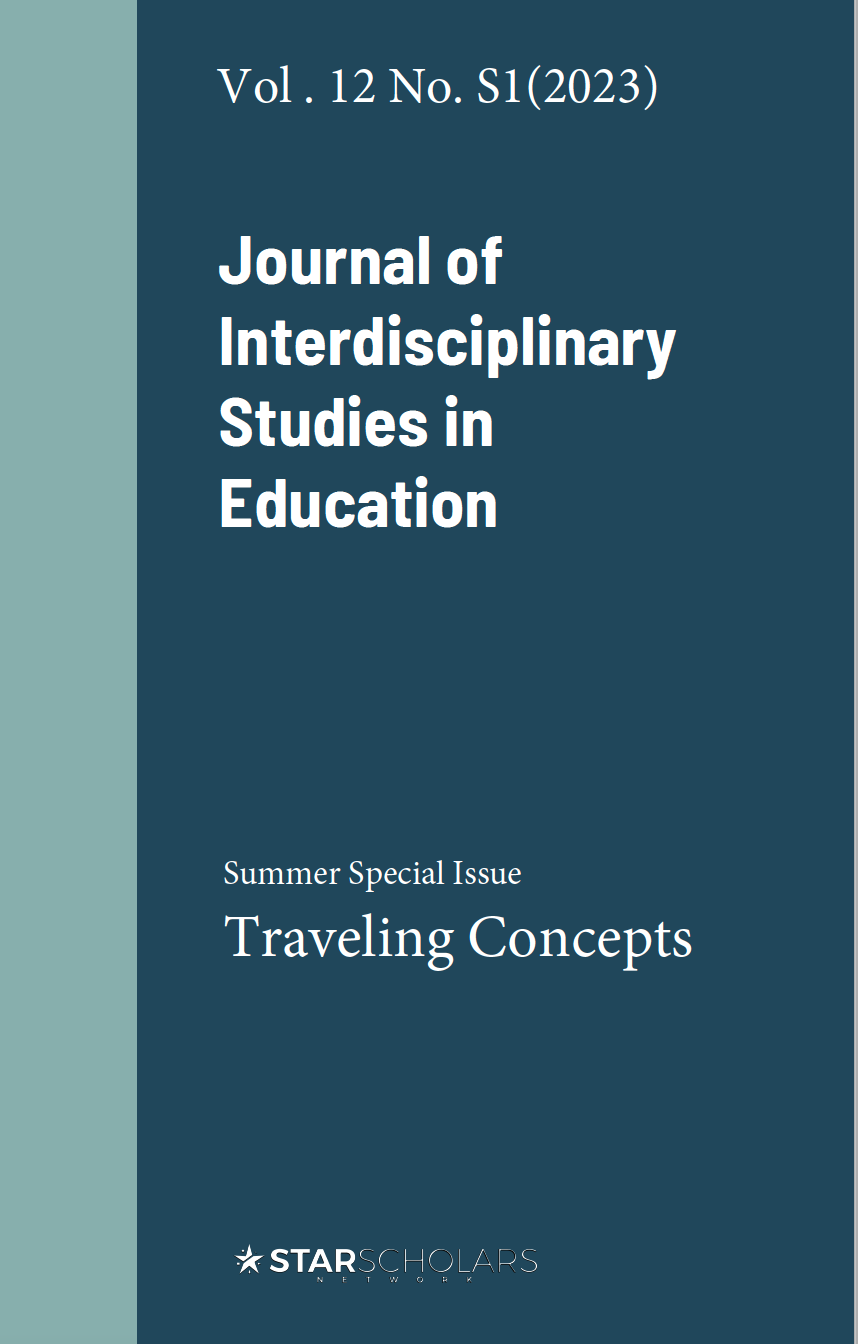How Concepts Travel in Actual Spaces
The Interdisciplinary Classroom as a Behavior Setting
Keywords:
behavior settings, interdisciplinarity, traveling conceptsAbstract
In interdisciplinary education, students find out that even basic concepts such as time, freedom or control mean different things for different disciplines and individuals. Through such encounters, students develop an ever-richer conceptual toolbox for making sense of the world. But, how do concepts travel (Bal, 2002) in an interdisciplinary classroom? I address this question from the perspective of behavior settings theory, which shows how the concrete spatiotemporal characteristics of an environment structure and guide the behavior of its participants. By means of a case study, I analyze the interdisciplinary classroom as a behavior setting and argue that concepts can travel when the setting stimulates students and teachers to spend time and interact with each other in specific ways.
Downloads
References
Augsburg, T. (2014). Becoming transdisciplinary: The emergence of the transdisciplinary individual. World Futures, 70(3-4), 233-247.
Baglione, S. L., & Nastanski, M. (2007). The superiority of online discussion: Faculty perceptions. Quarterly Review of Distance Education, 8(2), 139-150.
Bakhurst, D. (2011) The formation of reason. Oxford: Wiley-Blackwell.
Bal, M. (2002). Travelling Concepts in the Humanities: A Rough Guide. Toronto: University of Toronto Press.
Bang, J. (2012). An environmental affordance perspective on the study of development–artefacts, social others, and self. In World Yearbook of Education 2009, London: Routledge, pp. 181–201.
Barker, R. G. (1968). Ecological Psychology: Concepts and methods for studying the environment of human behavior. Palo Alto, CA: Stanford University Press
Barker, R. G. (Ed.). (1978). Habitats, environments, and human behavior: Studies in ecological psychology and eco-behavioral science from the Midwest Psychological Field Station, 1947 - 1972 (1. ed). Jossey-Bass.
Chawla, L., & Heft, H. (2002). Children's competence and the ecology of communities: a functional approach to the evaluation of participation. Journal of Environmental Psychology, 22(1-2), 201-216.
Chemero, A. (2003). An Outline of a Theory of Affordances. Ecological Psychology, 15(2), 181–195. https://doi.org/10.1207/S15326969ECO1502_5
Dumford, A. D., & Miller, A. L. (2018). Online learning in higher education: exploring advantages and disadvantages for engagement. Journal of Computing in Higher Education, 30(3), 452-465.
Fortuin, K. P. J., & Van Koppen, C. S. A. (2016). Teaching and learning reflexive skills in inter-and transdisciplinary research: A framework and its application in environmental science education. Environmental Education Research, 22(5), 697-716.
Gibson, J. (1977). The Theory of Affordances. In Perceiving, Acting, and Knowing: Toward an Ecological Psychology. Lawrence Erlbaum.
Haynes, C., & Leonard, J. B. (2010). From surprise parties to mapmaking: Undergraduate journeys toward interdisciplinary understanding. The Journal of Higher Education, 81(5), 645-666.
Heft, H. (2018). Places: Widening the scope of an ecological approach to perception–action with an emphasis on child development. Ecological Psychology, 30(1), 99-123.
Heft, H. (2020). Ecological psychology as social psychology? Theory & Psychology, 30(6), 813-826.
Kebritchi, M., Lipschuetz, A., & Santiague, L. (2017). Issues and challenges for teaching successful online courses in higher education: A literature review. Journal of Educational Technology Systems, 46(1), 4–29.
Keestra, M. (2017). Metacognition and reflection by interdisciplinary experts: Insights from cognitive science and philosophy. Issues in Interdisciplinary Studies 35, 121-69.
Leonard, J. B. (2012). Integrative Learning: A Grounded Theory. Issues in integrative studies, 30, 48-74.
Pedersen, S., & Bang, J. (2016). Youth development as Subjectified subjectivity–A dialectical-ecological model of analysis. Integrative Psychological and Behavioral Science, 50(3), 470–491.
Pedersen, S. (2019). Not just a school: Explorations and theoretical considerations in relation to the human eco-niche. In The 17th Biennial Conference of the International Society for Theoretical Psychology 2017: The Ethos of Theorizing. Captus Press, 212-221.
Repko, A.F. & Szostak, R. (2021). Interdisciplinary Research: Process and Theory (4th edition). Thousand Oaks CA: Sage.
Reyna, J. (2015). Active learning and the flipped classroom. Training & Development, October 2015.
Rödl, S. (2016). Education and autonomy. Journal of Philosophy of Education, 50(1), 84–97.
Roehl, A., Reddy, S. L., & Shannon, G. J. (2013). The flipped classroom: An opportunity to engage millennial students through active learning strategies. Journal of Family & Consumer Sciences, 105(2), 44-49.
Ryle, G. (1971). Teaching and training. In: Collected Essays 1929-1968: Collected Papers Volume 2. London: Hutchinson & Co, 451-64.
Van der Lecq, R. (2016). Self-Authorship Characteristics of Learners in the Context of an Interdisciplinary Curriculum: Evidence from Reflections. Issues in Interdisciplinary Studies, 34, 79-108.
Wright, H. F., Barker, R. G., Nall, J., & Schoggen, P. (1951). Toward a psychological ecology of the classroom. The Journal of Educational Research, 45(3), 187–200.
Additional Files
Published
Issue
Section
License
Copyright (c) 2023 Annemarie Kalis

This work is licensed under a Creative Commons Attribution-NonCommercial-NoDerivatives 4.0 International License.







